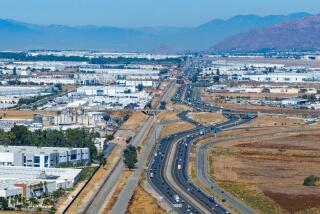Does the Valley Really Want to Secede?
YES:
‘It’s Impossible to Have Input at City Hall’ GUY WEDDINGTON McCREARY
Property manager, North Hollywood; board member, Universal City-North Hollywood Chamber of Commerce
I am a Valley historian and my family’s been involved in this community for 110 years. I know our Chamber of Commerce board voted unanimously to support secession; we have been behind that since 1973.
The San Fernando farmers were [told] by the city in 1914 that the water under the Valley was the city’s and the city would arrest anyone using it. It’s no wonder in 1915 that most of the Valley joined the city.
In the ‘50s, there was a [secession] movement but the Valley did not have the population or the economic base. In the late ‘70s, a strong movement called CIVIC was thwarted by the city’s powerful Sacramento lobby passing [a bill that] gave veto powers to the city. This was then and now totally wrong for an area equal to the sixth-largest city in the United States.
The Boland bill [a measure currently before the state Senate that would allow the Valley to vote on secession without the approval of the City Council] would give to the Valley its right to protect its own identity, to deal with its own problems as its own city if it desires to.
MARY EDWARDS
Member of pro-secession North Valley Coalition, lives in Granada Hills
The Valley seems to be the recipient of all the undesirable infrastructure. [For example,] The Times talked about, goodness, we’re getting a police academy. Well, we’re not getting the academy. The academy part is going somewhere else. What we’re getting is an unenclosed firing range and the driver training range.
We feel we are underrepresented and that our government is so distant it is almost impossible for a working community to have any input into what goes on at city hall. Government has to respond to the concerns of constituents and those constituents have [to have] some influence by voting in smaller districts in elections that are not so much determined by money.
NO:
Consider Water Rights and White Flight
CHRISTINE M. RODRIGUE
Professor of geography and planning, Cal State Chico, lives in Reseda
Speaking as a Valley resident since 1953, I have all sorts of objections to this. One is Balkanization. We have this single political and economic unit--Los Angeles--and secession would tend to fragment it. Each political unit will take very different stances toward the same problem, often leading to contradictory policies.
Another really big problem: the San Fernando Valley joined the city of Los Angeles in 1915 to participate in the city’s very high-order water rights. Los Angeles’ rights extend to the waters of the L.A. River, the Owens River water and also, interestingly, the ground water of the San Fernando Valley.
If the Valley were to secede, it would not even have rights to its own ground water.
Another objection, I think, is that there’s a racial dimension here. I wonder if this is a white-flight thing.
JEFF BUSH
President, Optiphase Inc., Van Nuys
It’s possibly counterproductive. We don’t believe that it will help the things that we have problems with. The only problem [my company] has had with city government is the Department of Water and Power. We moved into a building that had a meter which is inappropriate for the type of electrical power that we use and we just can’t get them to listen. But I don’t see anything in the transition from politics going from Los Angeles to the Valley that’s going to help or hurt us in that regard--the only thing is maybe some new phone numbers to call up to try get our power meter fixed.
Secession might possibly benefit Valley families and homeowners; people with kids would gain from additional tax dollars for education, for example. There may be other benefits, but I can’t see what they would be. In fact, there may be a disadvantage for business and families in the cost of funding the growth and learning curve of the new political infrastructure.
SORT OF:
How About ‘Something Like a Borough System?’
LOUISE MARQUEZ
Manager and marketing director, Panorama Mall, Panorama City.
With over a million people, it’s going to be very difficult for the Valley to secede. But I think [the ability to secede is] a valuable tool for the community to have to work with their legislative people. It’s a big stick--”If you don’t want to cooperate with us, we’ll go in another direction and that’s secession.” And it assists in keeping communities proactive.
I think dissatisfaction is widespread and I don’t think it’s a white flight issue. It [cuts] across all different cultures. The city has not been responsive to the needs of the San Fernando Valley and answerable for its own shortcomings.
BOB SCOTT
Attorney, Sherman Oaks; local issues chairman, Valley Industry and Commerce Assn., Woodland Hills
Compare the [Valley’s] lack of governance opportunity with such cities as San Fernando, Calabasas or Burbank, where constituents are able to elect a council member [who represents] thousands rather than hundreds of thousands of residents. They have an opportunity for grass-roots involvement.
Valley [residents] also have a sense they are being short-changed at all levels of municipal services. If the city was serious about trying to create equity for the Valley, they would take a long, hard look at complete charter reform. One proposal has been for establishing something [like] a borough system. If that could be done in an effective way, I’m not so sure that there would be the thrust for secession.
More to Read
Sign up for Essential California
The most important California stories and recommendations in your inbox every morning.
You may occasionally receive promotional content from the Los Angeles Times.










